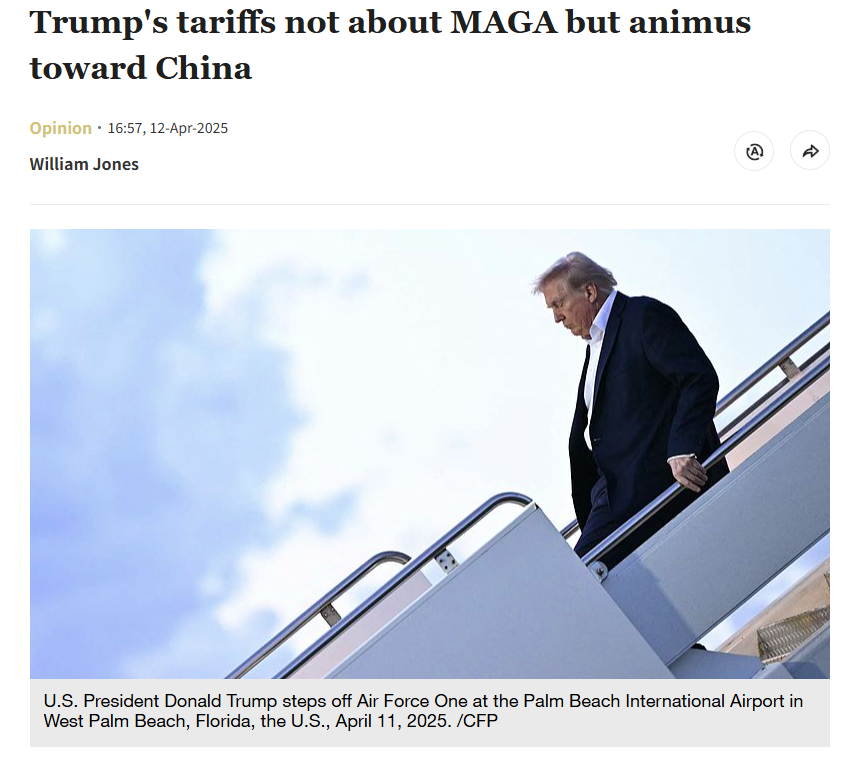LATEST INSIGHTS
Your Present Location: LATEST INSIGHTSWilliam Jones: Trump's tariffs not about MAGA but animus toward China
Source: CGTN Published: 2025-04-12

By William Jones
Former Washington bureau chief for Executive Intelligence Review News Service
Non-resident Senior Fellow of the Chongyang Institute for Financial Studies at Renmin University of China (RDCY)
Nothing characterizes the real nature of the current U.S. tariff policy better than President Donald Trump standing in the Rose Garden with a list of several dozen countries and the tariffs each must pay the United States allegedly to "make America great again" (MAGA).
Most of these countries have populations already living on the verge of poverty. Why do countries like Lesotho, Laos, and Cambodia have to pay to allegedly improve the prosperity of the United States? Have they contributed to the United States losing much of its productive capacity over the years through a policy of outsourcing its industries and its productive labor power to countries providing cheap labor? Are these nations responsible for U.S. cities becoming slums and U.S. industrial areas rust buckets?
The Trump tariff policy is nothing less than an attempt to tax the world in order to finance what is supposed to be a revitalization of America's domestic economy. The British empire practiced a similar policy during the 19th century when the "colonies" of the "empire" in Africa and Asia were squeezed out of their wealth. But that wealth did not go into the livelihood of the working class in Britain, which itself always remained one step from poverty, but into the pockets of the British capitalists. And in spite of Trump's promises to his MAGA supporters, the same thing would happen with his tariffs, if they are fully implemented.
However, it is unlikely that this will happen. The threat has already seriously roiled world markets, forcing Trump to call a 90-day "pause" before implementing them, that is, on all other countries except China, on which an outrageous 145 percent tariff has been placed. The impacts of this will soon be felt by many of those working class MAGA supporters, who shop at the low-price Walmart or Costco in order to keep their costs of living low. The subsequent price increase will be paid by them.
But why this particular animus toward China? An obvious explanation would be the size of China as an economic power. This is therefore a simple attempt to maintain U.S. hegemony.
But China's development has also sparked a new sense of development within the entire developing sector, with the Belt and Road Initiative (BRI) providing an economic framework for these countries to develop. Reducing the role of China in the world by reducing its economic leverage would also effectively set the other countries of the Global South back one or more decades in their own development.
The size of the tariffs could reduce them even further with no prospect of becoming anything but poor, undeveloped nations. Forty years of being dominated by a U.S.-centered system brought many of these countries from relative prosperity to complete penury. The U.S. Marshall Plan to restore the economic infrastructure of postwar Europe never touched them, and the workings of Bretton Woods, the West-dominated monetary management system, and the resurgence of "dollar diplomacy" meant the system was rigged against them. China's rise and the BRI changed all of that overnight. Trump's tariffs are aimed at bringing those "good old days" back.
Most Global South nations are aware of these facts. While they are breathing a sigh of relief at the 90-day pause in tariffs, they are aware of who are their friends and who are not. And as the 90 days expire, they will again be under the gun of the imperial U.S. president.
For many of these nations, the tariffs they have imposed are of a protective nature. Coming into the global system with little economic power, a protective tariff can prevent inordinate "dumping" by the more developed countries, which would prevent them from ever becoming more than raw materials producers for the more developed nations.
The Trump tariffs, on the other hand, are simply used as elements of raw power, threatening destruction if the countries do not obey the U.S. dictate. Few countries would accept such a condition except under duress. China is one of the few which has the wherewithal to refuse such unjustified pretensions, and others will flock to its banner. They will not have to fight this battle alone. As the poet Schiller so eloquently put it, "There is a limit to the tyrant's power."
Key Words: William Jones, RDCY, Trump's Tariifs, China























































































 京公网安备 11010802037854号
京公网安备 11010802037854号





